
ISEK
A decentralized agent network for building collaborative, LLM-powered agent-to-agent (A2A) systems.
Stars: 448
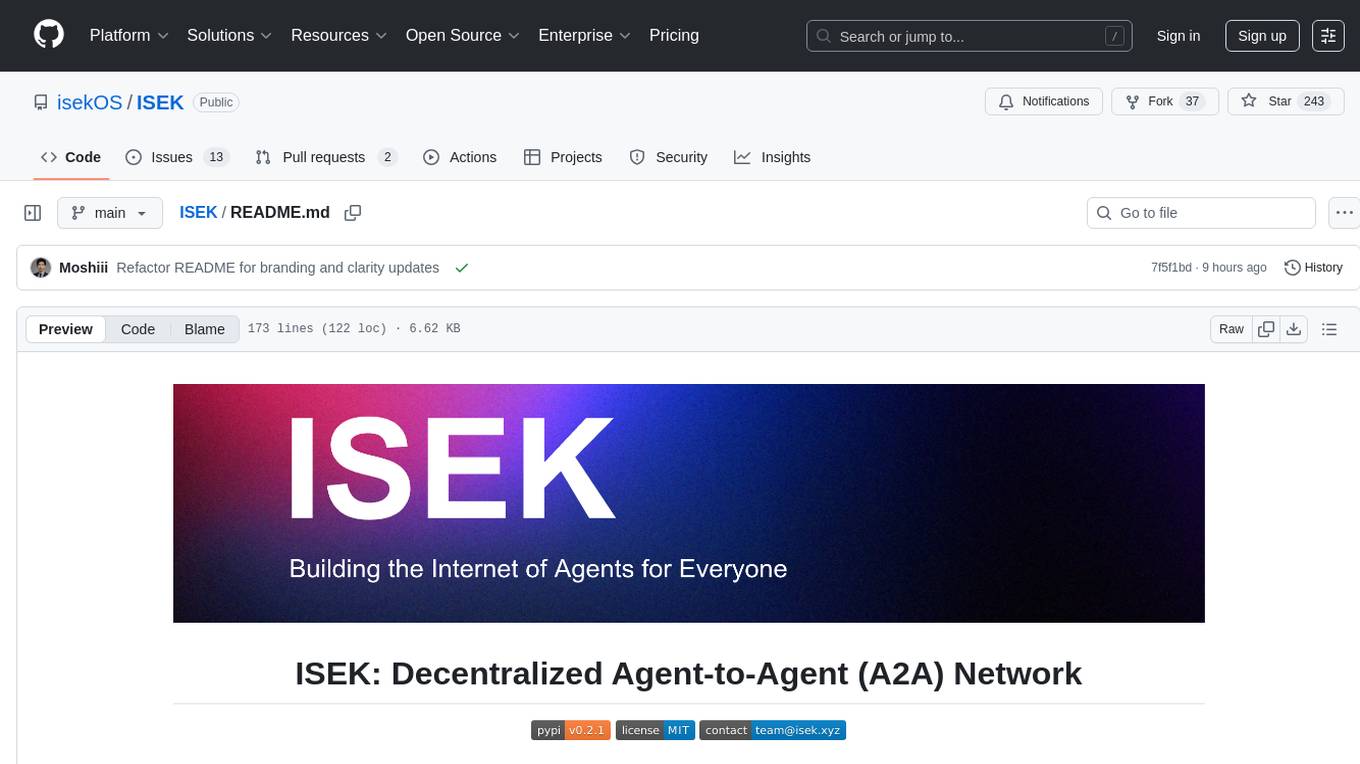
ISEK is a decentralized agent network framework that enables building intelligent, collaborative agent-to-agent systems. It integrates the Google A2A protocol and ERC-8004 contracts for identity registration, reputation building, and cooperative task-solving, creating a self-organizing, decentralized society of agents. The platform addresses challenges in the agent ecosystem by providing an incentive system for users to pay for agent services, motivating developers to build high-quality agents and fostering innovation and quality in the ecosystem. ISEK focuses on decentralized agent collaboration and coordination, allowing agents to find each other, reason together, and act as a decentralized system without central control. The platform utilizes ERC-8004 for decentralized identity, reputation, and validation registries, establishing trustless verification and reputation management.
README:
ISEK is a decentralized agent network framework for building intelligent, collaborative agent-to-agent (A2A) systems. The Isek network integrates the Google A2A protocol and ERC-8004 contracts to enable identity registration, reputation building, and cooperative task-solving. Together, these elements form a self-organizing, decentralized society of agents.
🧪 ISEK is under active development. Contributions, feedback, and experiments are highly welcome.
Our platform allows agent developers to run their agents locally. Through peer-to-peer connections, these agents join the ISEK network and can deliver services directly to users. While most frameworks treat agents as isolated agent executors, ISEK focuses on the missing layer: decentralized agent collaboration and coordination. We believe the future of intelligent systems lies in self-organizing agent networks capable of context sharing, team formation, and collective reasoning — all without central control.
ISEK is not just about running agents — it's about empowering them to find each other, reason together, and act as a decentralized system.
ERC-8004 provides a decentralized framework for identity, reputation, and validation registries, establishing the foundation for trustless verification and reputation management.
-
**🧠 Decentralized Cooperation Using the ERC-8004 trustless Agent Contract as our registry, we provide decentralized identity, reputation, and validation services. Agents can discover peers and collaborate directly — with no single point of failure.
-
**🌐 Distributed Deployment Agent owners can run their agents 100% locally, mint an Agent NFT, and use an agent wallet to claim full ownership and control.
-
**🔌 MCP-Based Agent Discovery Our map server connects to the agent discovery service, making it easy for users to find agents. Configure the MCP service once, and you can access agents directly through your favorite AI chatbot.
-
**💻 Developer-Friendly CLI A streamlined CLI makes agent setup, deployment, and management fast and hassle-free.
pip install isek
isek setup- Python 3.10+
- Node.js 18+ (for P2P functionality)
💡 Tip: The
isek setupcommand automatically handles both Python and JavaScript dependencies.
Create a .env file:
OPENAI_MODEL_NAME=gpt-4o-mini
OPENAI_BASE_URL=https://api.openai.com/v1
OPENAI_API_KEY=your_api_keyfrom isek.agent.isek_agent import IsekAgent
from isek.models.openai import OpenAIModel
import dotenv
dotenv.load_dotenv()
agent = IsekAgent(
name="My Agent",
model=OpenAIModel(model_id="gpt-4o-mini"),
description="A helpful assistant",
instructions=["Be polite", "Provide accurate information"],
success_criteria="User gets a helpful response"
)
response = agent.run("hello")In the examples folder, follow the examples from level 1 to level 10, and you should have a good understanding of ISEK
isek setup # Install Python and JavaScript dependencies
isek clean # Clean temporary files
isek --help # View available commandsisek/
├── examples # Sample scripts demonstrating Isek usage
├── isek # Core functionality and modules
│ ├── agent # Agent logic and behavior
│ ├── node # Node orchestration
│ ├── protocol # Inter-Agent communication Protocol Layer
│ ├── memory # Agent state and context
│ ├── models # LLM backends and interfaces
│ ├── team # Multi-Agent Organization Interface
│ ├── tools # The toolkit library for Agents
│ ├── utils # Utility functions
│ ├── cli.py # CLI entry point
│ └── isek_center.py # Local registry and coordinator
├── docs/ # Documentation
└── README.md # Project overview and documentation
We welcome collaborators, researchers, and early adopters!
- 💬 Open issues or suggestions via GitHub Issues
- 📧 Contact us directly: [email protected]
- 📄 See our Contribution Guidelines
Licensed under the MIT License.
ISEK is an open-source, permissionless framework for building decentralized agent coordination systems.
The contributors do not operate, control, or monitor any deployed agents or their behavior.
By using this project, you accept full responsibility for your actions. See LEGAL.md for more details.
Made with ❤️ by the Isek Team
Autonomy is not isolation. It's cooperation, at scale.
For Tasks:
Click tags to check more tools for each tasksFor Jobs:
Alternative AI tools for ISEK
Similar Open Source Tools

ISEK
ISEK is a decentralized agent network framework that enables building intelligent, collaborative agent-to-agent systems. It integrates the Google A2A protocol and ERC-8004 contracts for identity registration, reputation building, and cooperative task-solving, creating a self-organizing, decentralized society of agents. The platform addresses challenges in the agent ecosystem by providing an incentive system for users to pay for agent services, motivating developers to build high-quality agents and fostering innovation and quality in the ecosystem. ISEK focuses on decentralized agent collaboration and coordination, allowing agents to find each other, reason together, and act as a decentralized system without central control. The platform utilizes ERC-8004 for decentralized identity, reputation, and validation registries, establishing trustless verification and reputation management.
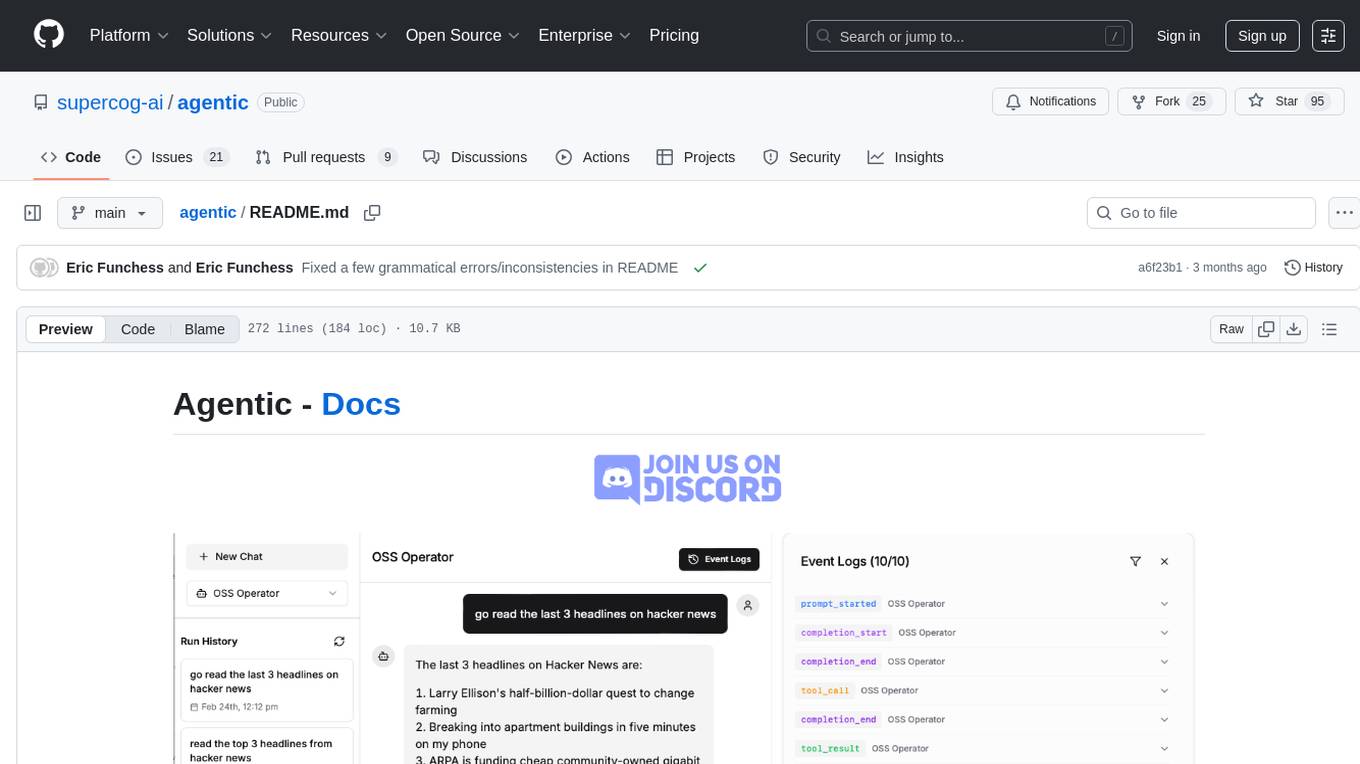
agentic
Agentic is a lightweight and flexible Python library for building multi-agent systems. It provides a simple and intuitive API for creating and managing agents, defining their behaviors, and simulating interactions in a multi-agent environment. With Agentic, users can easily design and implement complex agent-based models to study emergent behaviors, social dynamics, and decentralized decision-making processes. The library supports various agent architectures, communication protocols, and simulation scenarios, making it suitable for a wide range of research and educational applications in the fields of artificial intelligence, machine learning, social sciences, and robotics.
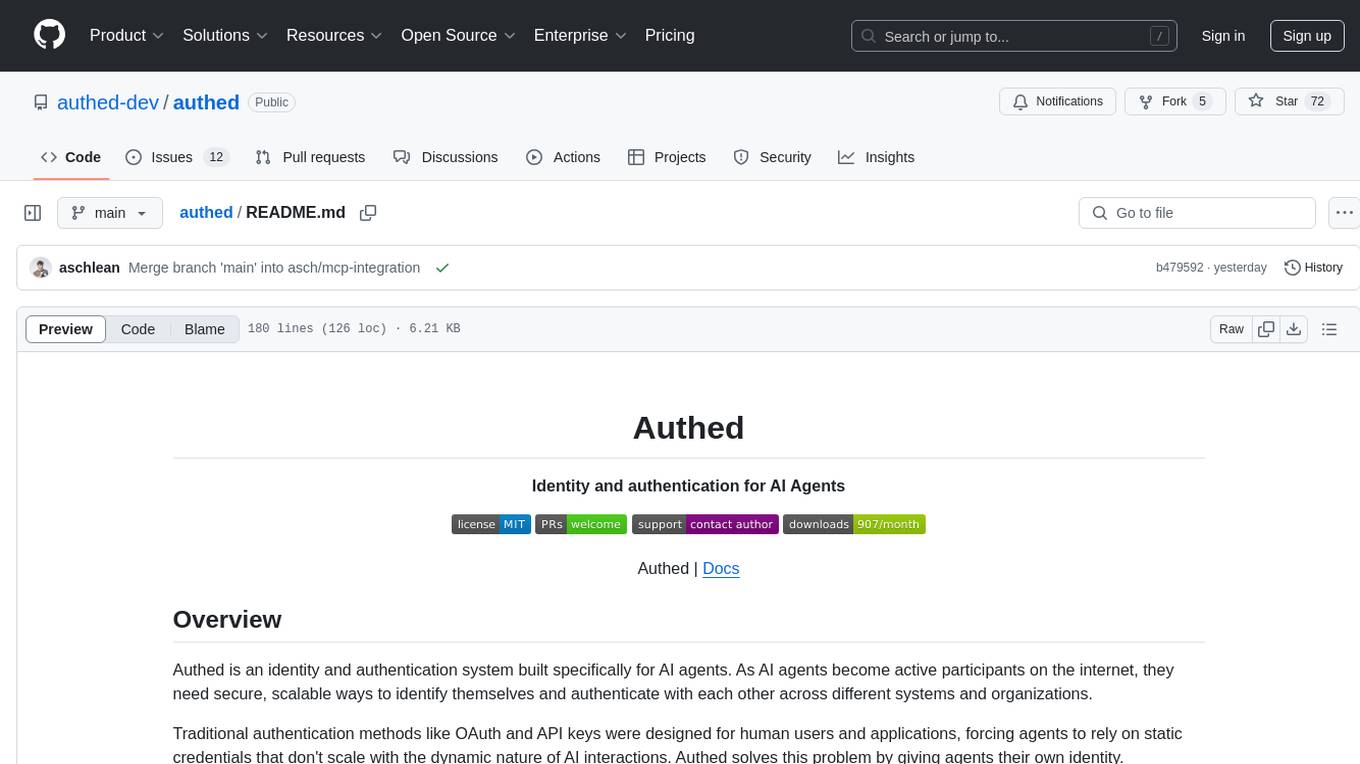
authed
Authed is an identity and authentication system designed for AI agents, providing unique identities, secure agent-to-agent authentication, and dynamic access policies. It eliminates the need for static credentials and human intervention in authentication workflows. The protocol is developer-first, open-source, and scalable, enabling AI agents to interact securely across different ecosystems and organizations.
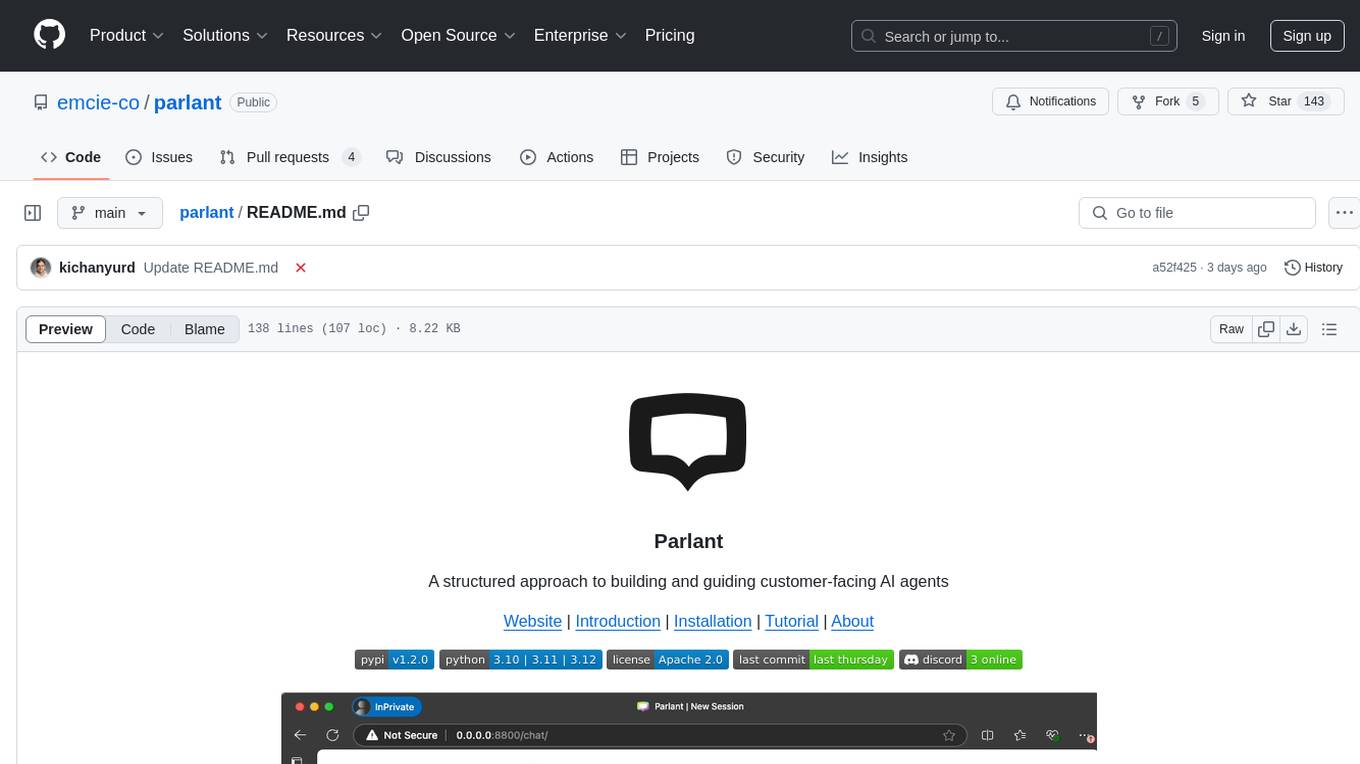
parlant
Parlant is a structured approach to building and guiding customer-facing AI agents. It allows developers to create and manage robust AI agents, providing specific feedback on agent behavior and helping understand user intentions better. With features like guidelines, glossary, coherence checks, dynamic context, and guided tool use, Parlant offers control over agent responses and behavior. Developer-friendly aspects include instant changes, Git integration, clean architecture, and type safety. It enables confident deployment with scalability, effective debugging, and validation before deployment. Parlant works with major LLM providers and offers client SDKs for Python and TypeScript. The tool facilitates natural customer interactions through asynchronous communication and provides a chat UI for testing new behaviors before deployment.
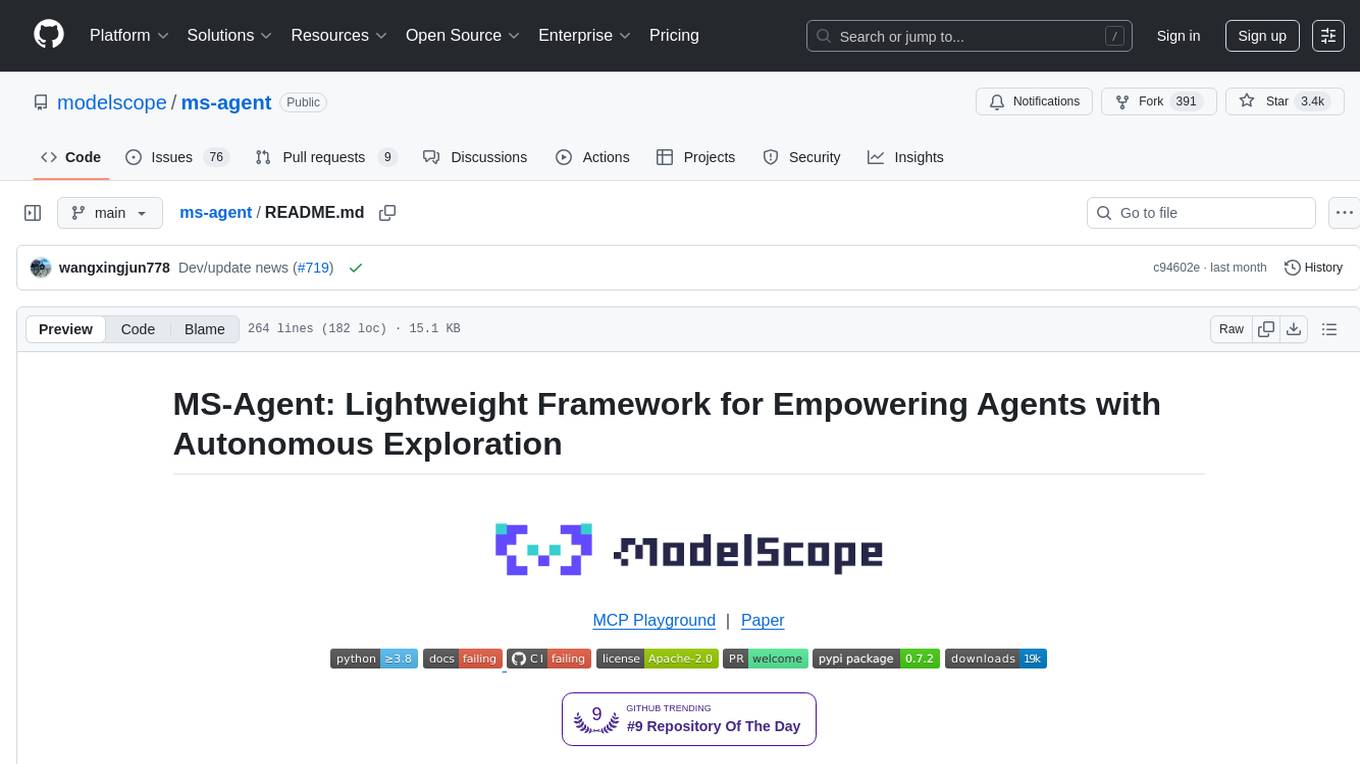
ms-agent
MS-Agent is a lightweight framework designed to empower agents with autonomous exploration capabilities. It provides a flexible and extensible architecture for creating agents capable of tasks like code generation, data analysis, and tool calling with MCP support. The framework supports multi-agent interactions, deep research, code generation, and is lightweight and extensible for various applications.
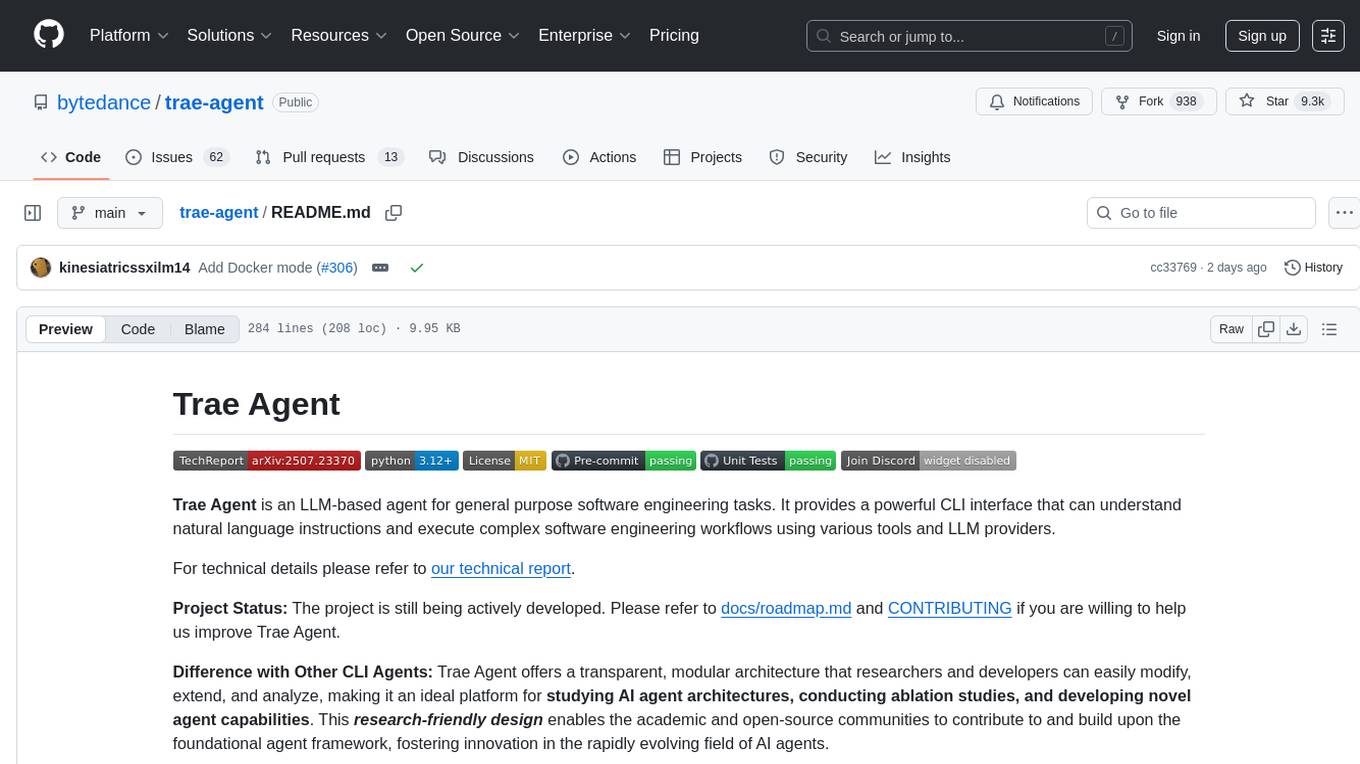
trae-agent
Trae-agent is a Python library for building and training reinforcement learning agents. It provides a simple and flexible framework for implementing various reinforcement learning algorithms and experimenting with different environments. With Trae-agent, users can easily create custom agents, define reward functions, and train them on a variety of tasks. The library also includes utilities for visualizing agent performance and analyzing training results, making it a valuable tool for both beginners and experienced researchers in the field of reinforcement learning.
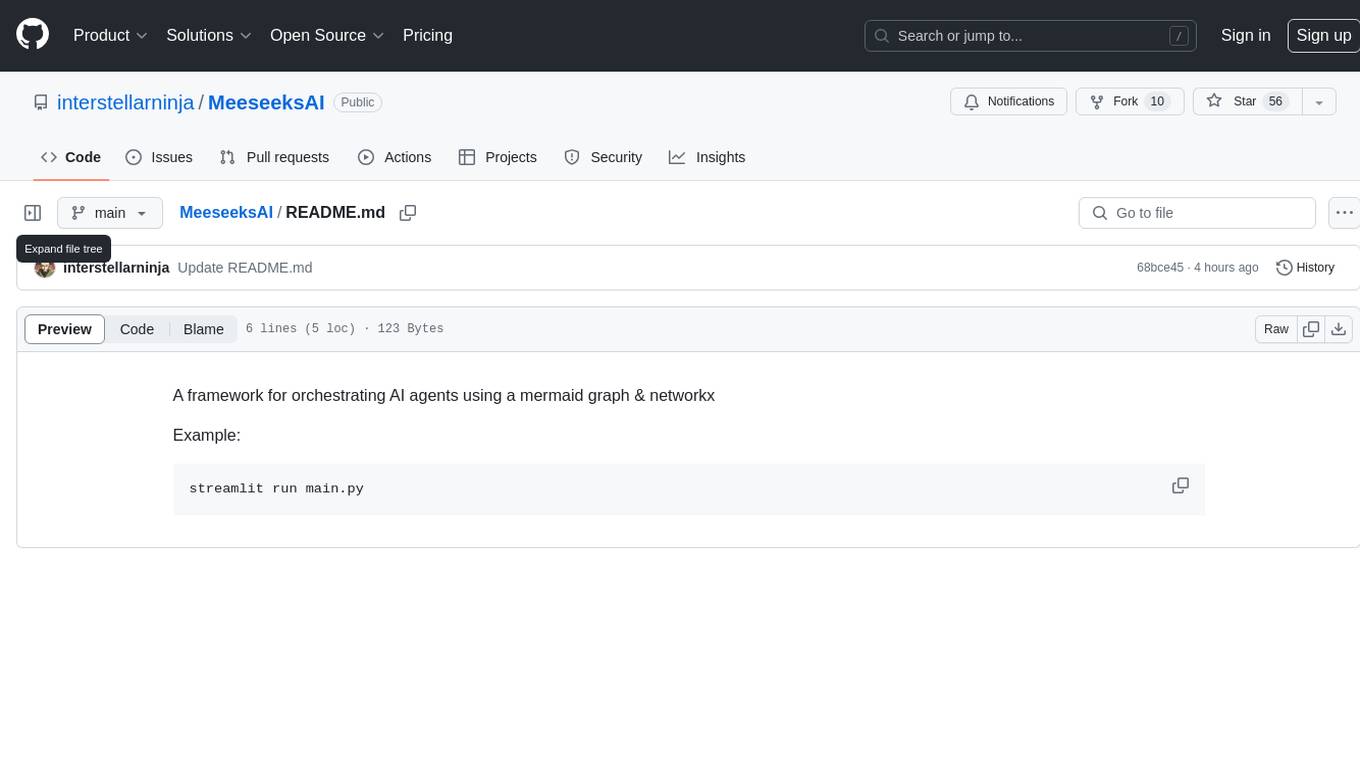
MeeseeksAI
MeeseeksAI is a framework designed to orchestrate AI agents using a mermaid graph and networkx. It provides a structured approach to managing and coordinating multiple AI agents within a system. The framework allows users to define the interactions and dependencies between agents through a visual representation, making it easier to understand and modify the behavior of the AI system. By leveraging the power of networkx, MeeseeksAI enables efficient graph-based computations and optimizations, enhancing the overall performance of AI workflows. With its intuitive design and flexible architecture, MeeseeksAI simplifies the process of building and deploying complex AI systems, empowering users to create sophisticated agent interactions with ease.
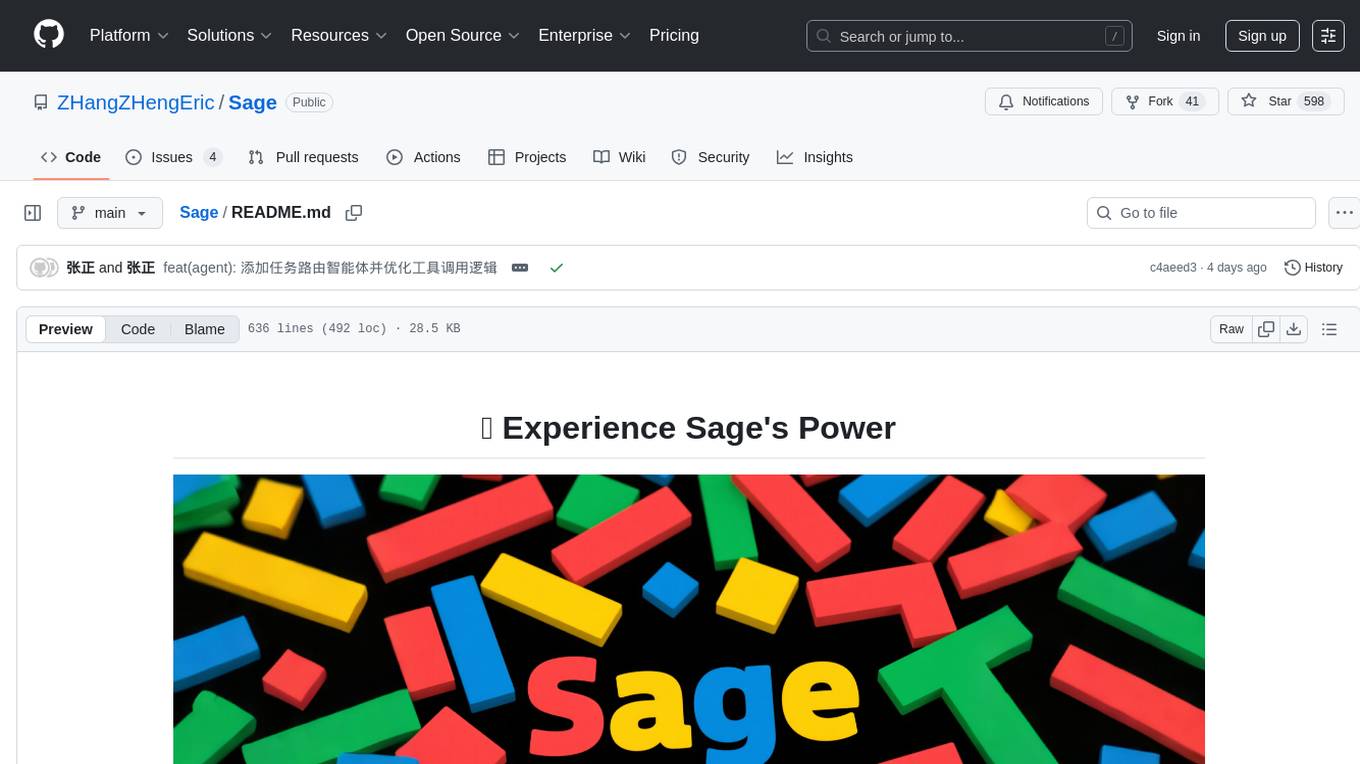
Sage
Sage is a production-ready, modular, and intelligent multi-agent orchestration framework for complex problem solving. It intelligently breaks down complex tasks into manageable subtasks through seamless agent collaboration. Sage provides Deep Research Mode for comprehensive analysis and Rapid Execution Mode for quick task completion. It offers features like intelligent task decomposition, agent orchestration, extensible tool system, dual execution modes, interactive web interface, advanced token tracking, rich configuration, developer-friendly APIs, and robust error recovery mechanisms. Sage supports custom workflows, multi-agent collaboration, custom agent development, agent flow orchestration, rule preferences system, message manager for smart token optimization, task manager for comprehensive state management, advanced file system operations, advanced tool system with plugin architecture, token usage & cost monitoring, and rich configuration system. It also includes real-time streaming & monitoring, advanced tool development, error handling & reliability, performance monitoring, MCP server integration, and security features.
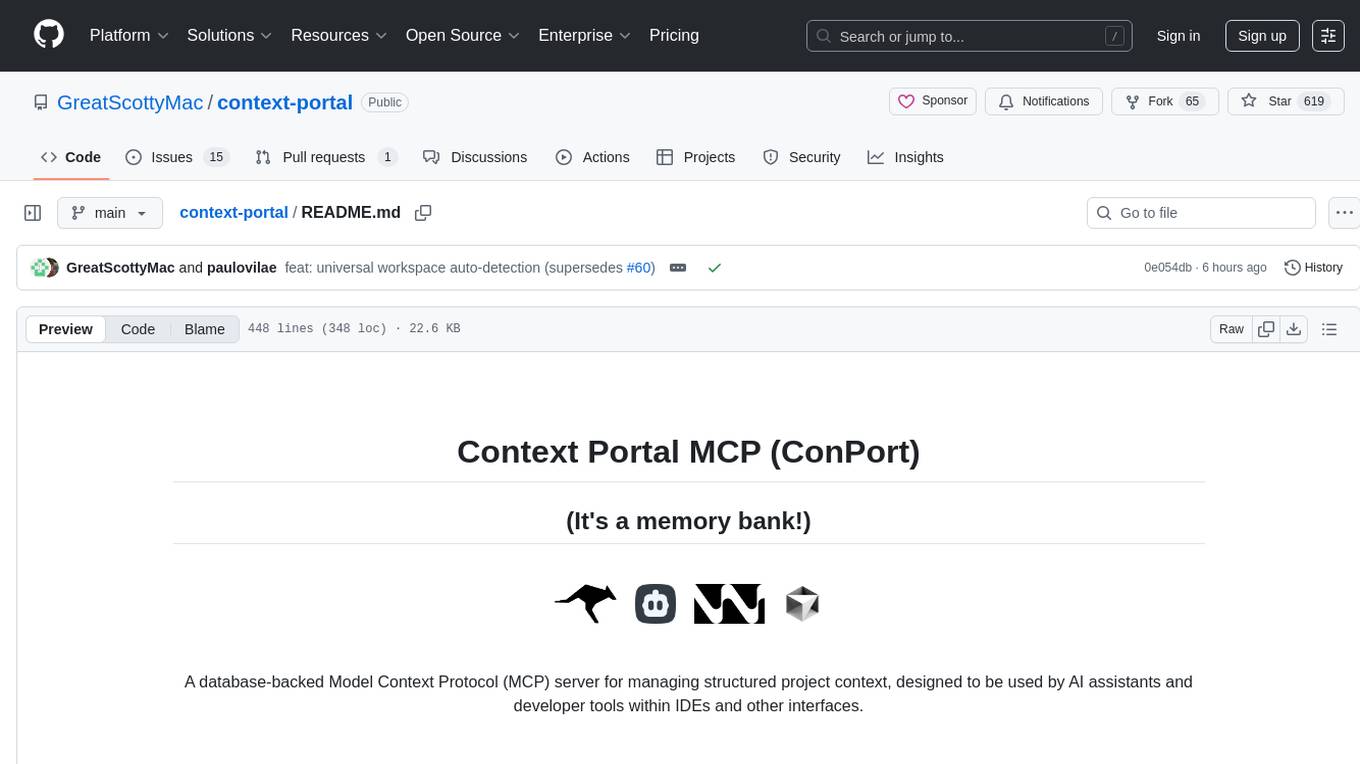
context-portal
Context-portal is a versatile tool for managing and visualizing data in a collaborative environment. It provides a user-friendly interface for organizing and sharing information, making it easy for teams to work together on projects. With features such as customizable dashboards, real-time updates, and seamless integration with popular data sources, Context-portal streamlines the data management process and enhances productivity. Whether you are a data analyst, project manager, or team leader, Context-portal offers a comprehensive solution for optimizing workflows and driving better decision-making.
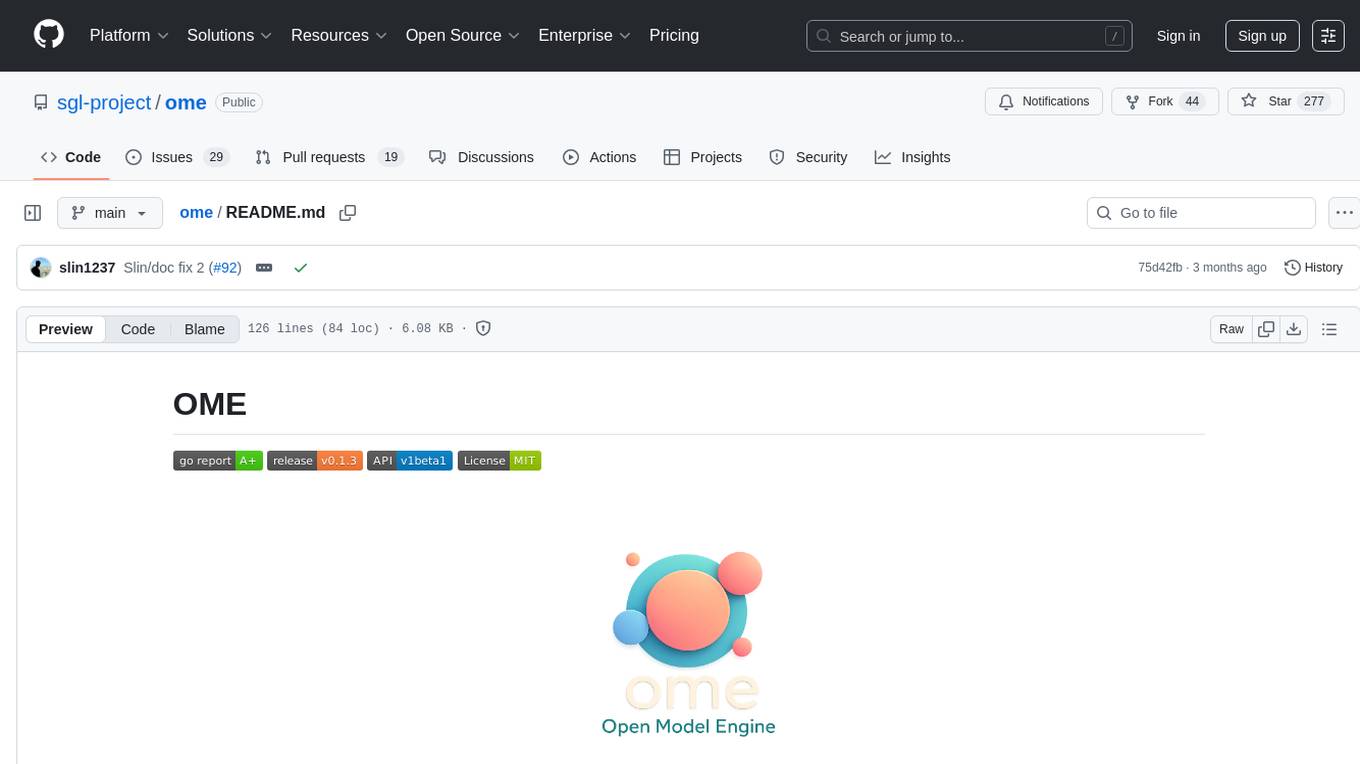
ome
Ome is a versatile tool designed for managing and organizing tasks and projects efficiently. It provides a user-friendly interface for creating, tracking, and prioritizing tasks, as well as collaborating with team members. With Ome, users can easily set deadlines, assign tasks, and monitor progress to ensure timely completion of projects. The tool offers customizable features such as tags, labels, and filters to streamline task management and improve productivity. Ome is suitable for individuals, teams, and organizations looking to enhance their task management process and achieve better results.
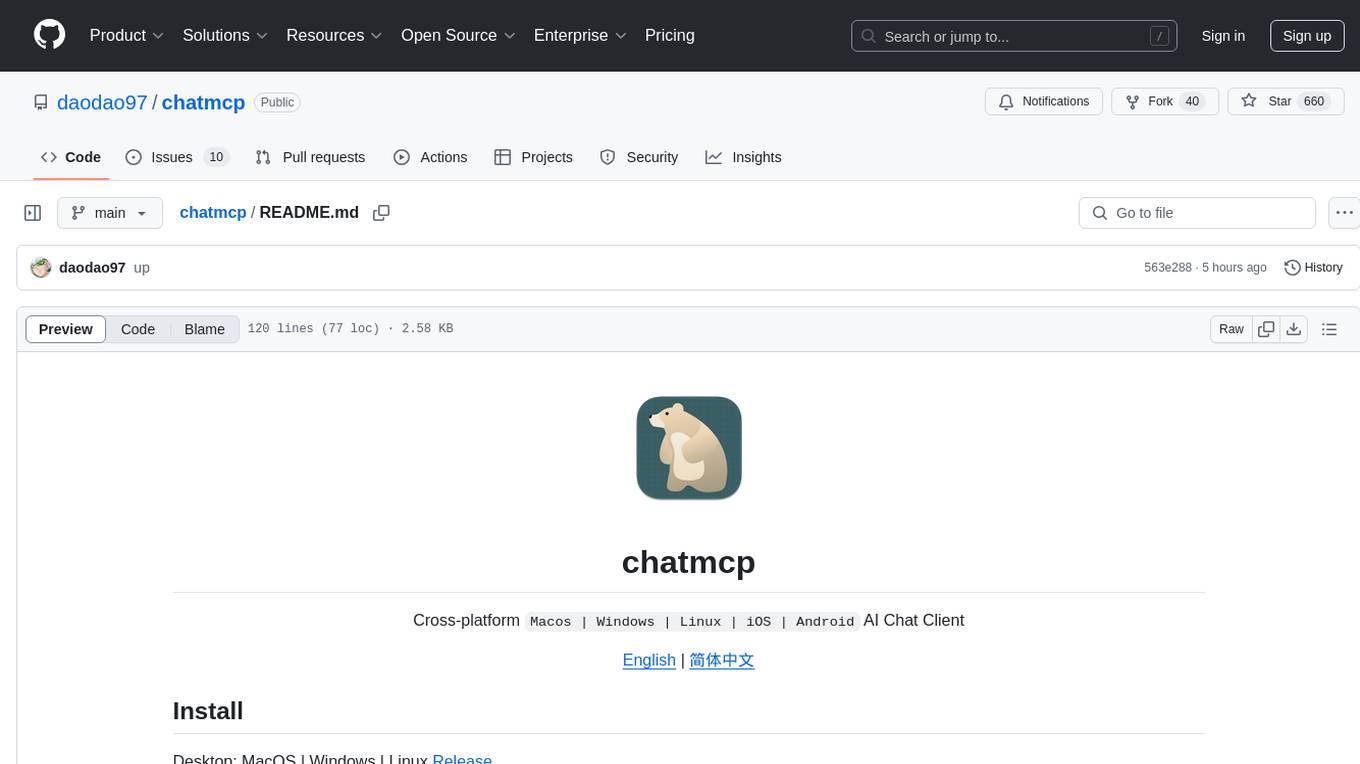
chatmcp
Chatmcp is a chatbot framework for building conversational AI applications. It provides a flexible and extensible platform for creating chatbots that can interact with users in a natural language. With Chatmcp, developers can easily integrate chatbot functionality into their applications, enabling users to communicate with the system through text-based conversations. The framework supports various natural language processing techniques and allows for the customization of chatbot behavior and responses. Chatmcp simplifies the development of chatbots by providing a set of pre-built components and tools that streamline the creation process. Whether you are building a customer support chatbot, a virtual assistant, or a chat-based game, Chatmcp offers the necessary features and capabilities to bring your conversational AI ideas to life.
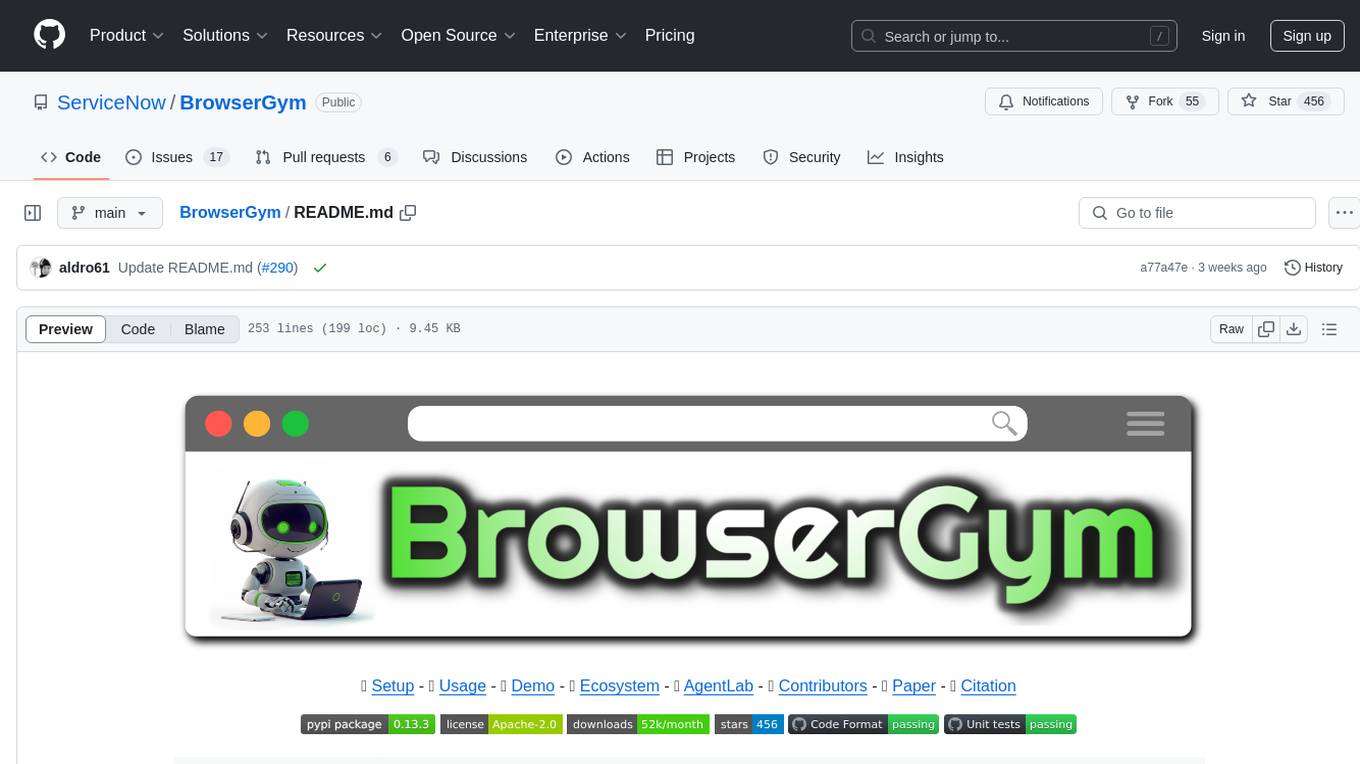
BrowserGym
BrowserGym is an open, easy-to-use, and extensible framework designed to accelerate web agent research. It provides benchmarks like MiniWoB, WebArena, VisualWebArena, WorkArena, AssistantBench, and WebLINX. Users can design new web benchmarks by inheriting the AbstractBrowserTask class. The tool allows users to install different packages for core functionalities, experiments, and specific benchmarks. It supports the development setup and offers boilerplate code for running agents on various tasks. BrowserGym is not a consumer product and should be used with caution.
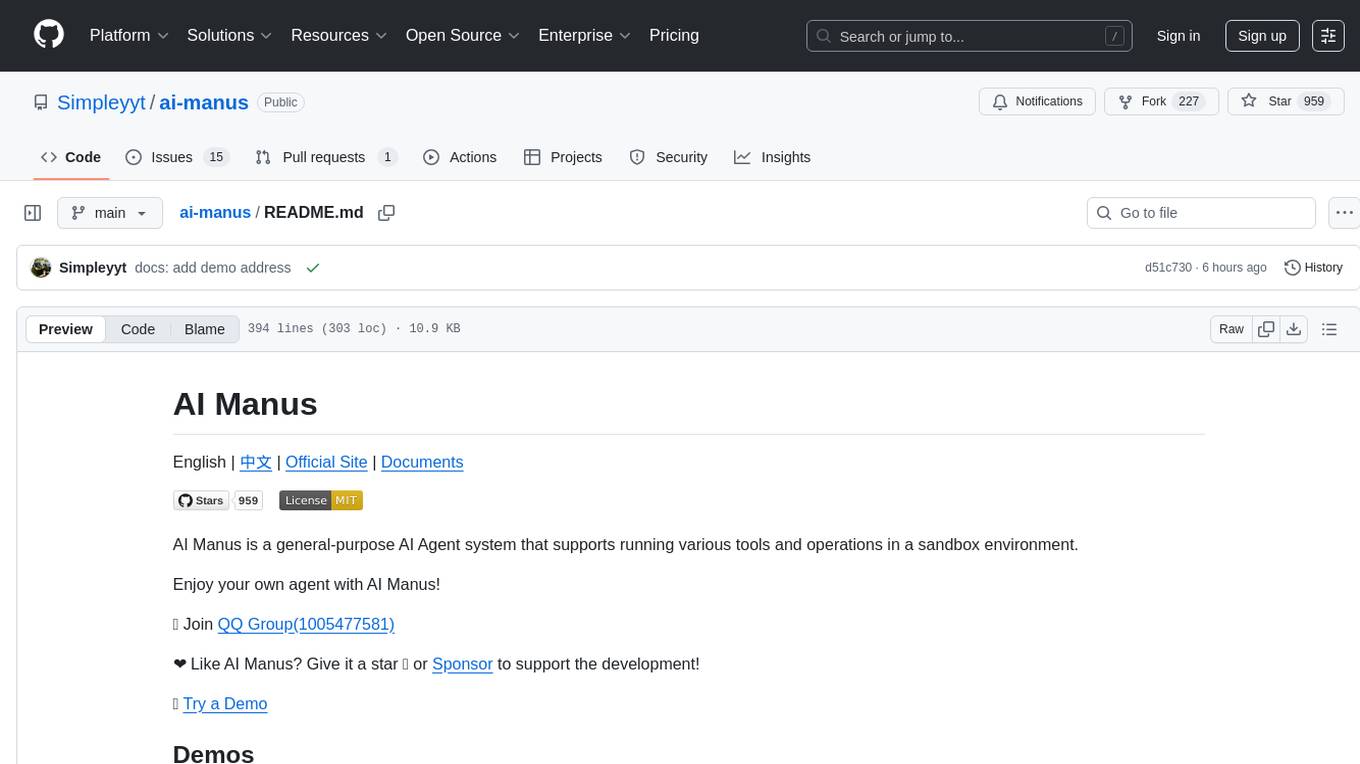
ai-manus
AI Manus is a general-purpose AI Agent system that supports running various tools and operations in a sandbox environment. It offers deployment with minimal dependencies, supports multiple tools like Terminal, Browser, File, Web Search, and messaging tools, allocates separate sandboxes for tasks, manages session history, supports stopping and interrupting conversations, file upload and download, and is multilingual. The system also provides user login and authentication. The project primarily relies on Docker for development and deployment, with model capability requirements and recommended Deepseek and GPT models.
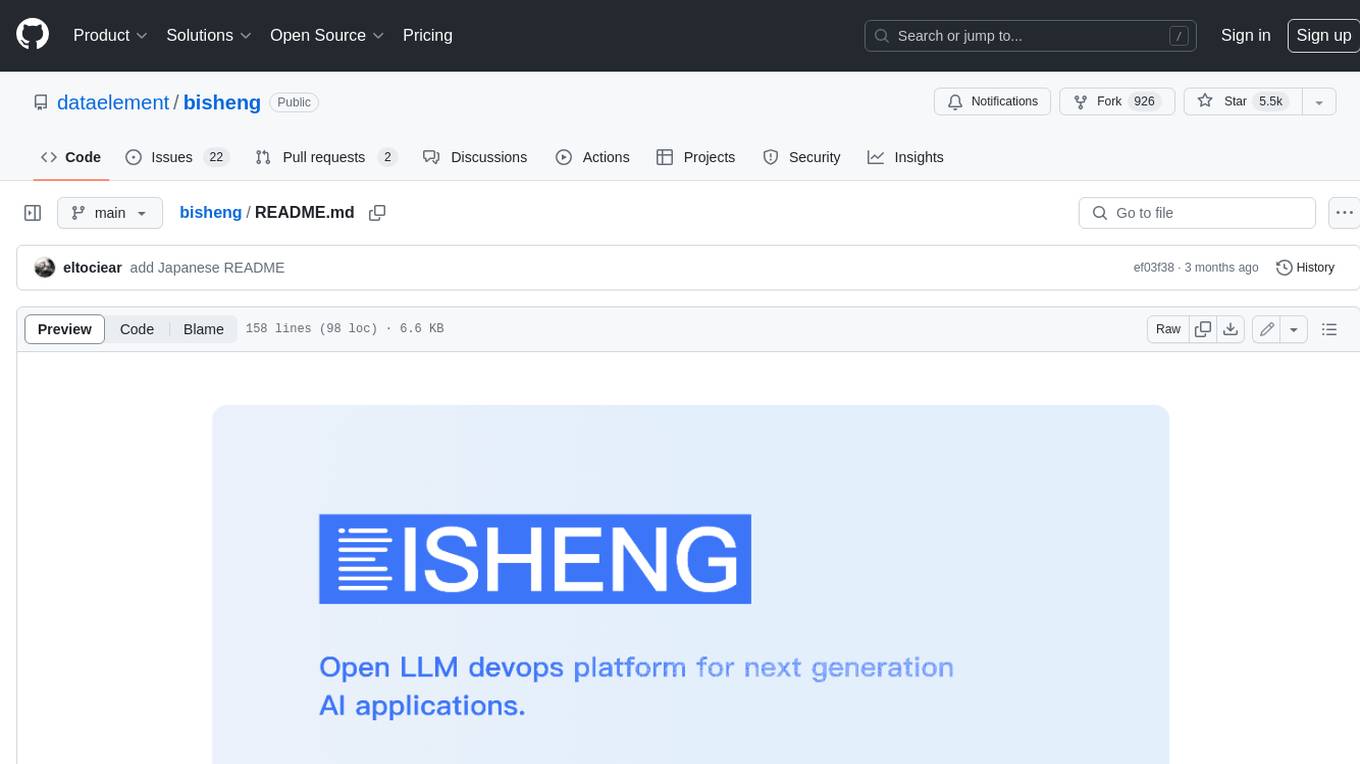
bisheng
Bisheng is a leading open-source **large model application development platform** that empowers and accelerates the development and deployment of large model applications, helping users enter the next generation of application development with the best possible experience.
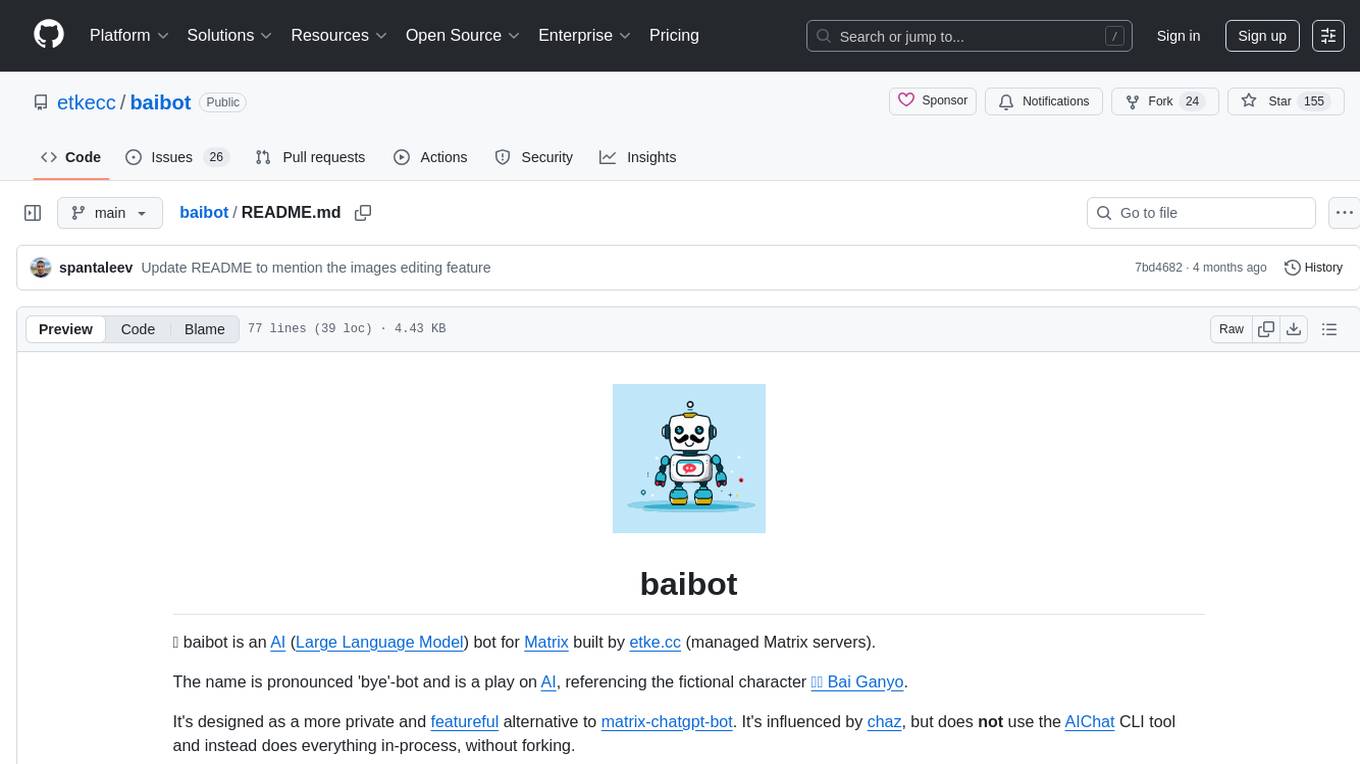
baibot
Baibot is a versatile chatbot framework designed to simplify the process of creating and deploying chatbots. It provides a user-friendly interface for building custom chatbots with various functionalities such as natural language processing, conversation flow management, and integration with external APIs. Baibot is highly customizable and can be easily extended to suit different use cases and industries. With Baibot, developers can quickly create intelligent chatbots that can interact with users in a seamless and engaging manner, enhancing user experience and automating customer support processes.
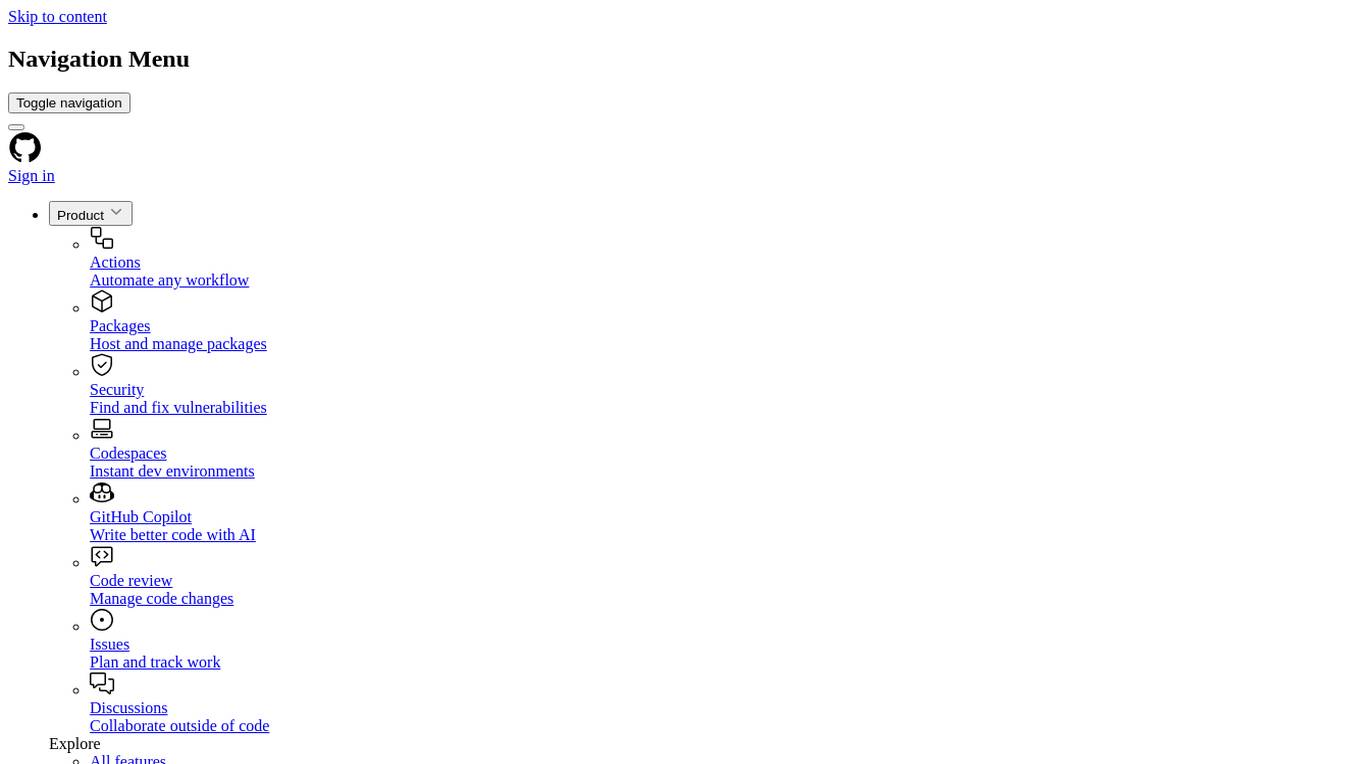
J.A.R.V.I.S.
J.A.R.V.I.S.1.0 is an advanced virtual assistant tool designed to assist users in various tasks. It provides a wide range of functionalities including voice commands, task automation, information retrieval, and communication management. With its intuitive interface and powerful capabilities, J.A.R.V.I.S.1.0 aims to enhance productivity and streamline daily activities for users.
For similar tasks
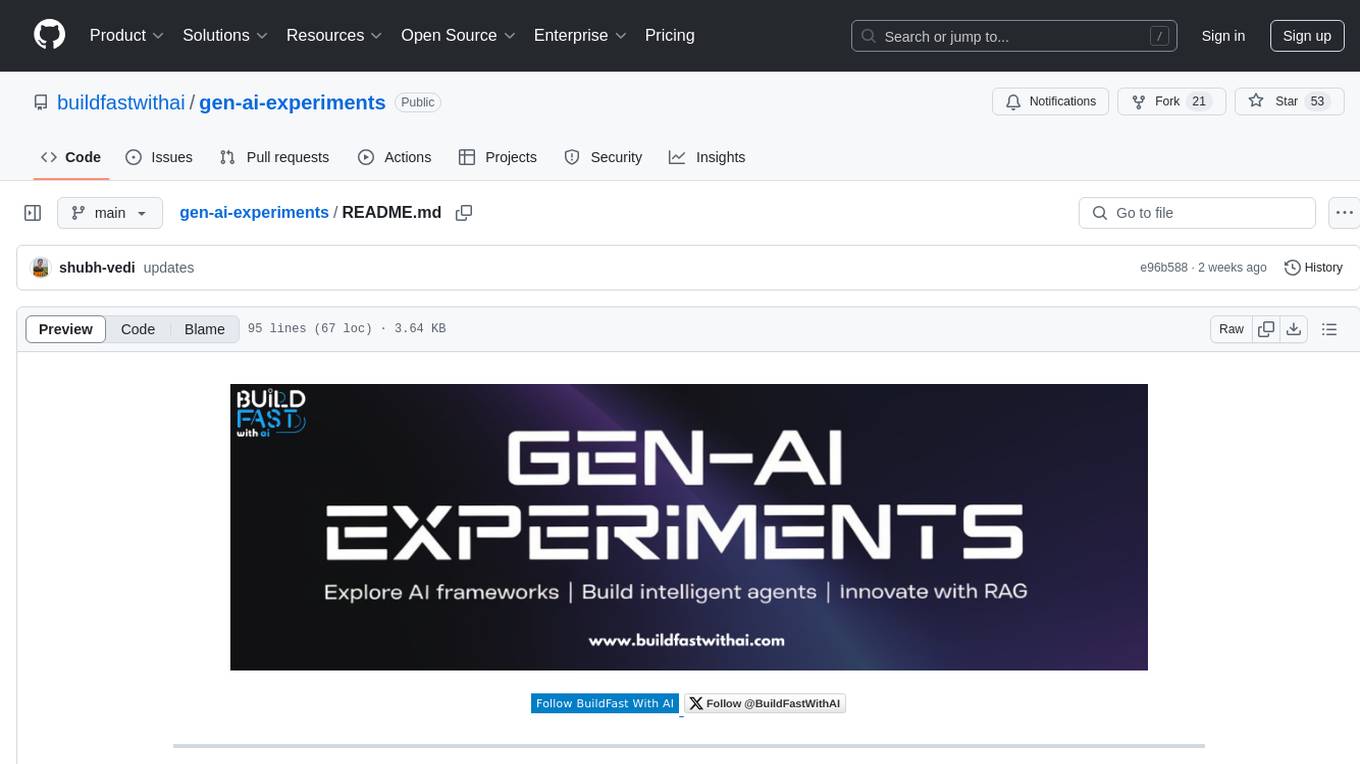
gen-ai-experiments
Gen-AI-Experiments is a structured collection of Jupyter notebooks and AI experiments designed to guide users through various AI tools, frameworks, and models. It offers valuable resources for both beginners and experienced practitioners, covering topics such as AI agents, model testing, RAG systems, real-world applications, and open-source tools. The repository includes folders with curated libraries, AI agents, experiments, LLM testing, open-source libraries, RAG experiments, and educhain experiments, each focusing on different aspects of AI development and application.

ISEK
ISEK is a decentralized agent network framework that enables building intelligent, collaborative agent-to-agent systems. It integrates the Google A2A protocol and ERC-8004 contracts for identity registration, reputation building, and cooperative task-solving, creating a self-organizing, decentralized society of agents. The platform addresses challenges in the agent ecosystem by providing an incentive system for users to pay for agent services, motivating developers to build high-quality agents and fostering innovation and quality in the ecosystem. ISEK focuses on decentralized agent collaboration and coordination, allowing agents to find each other, reason together, and act as a decentralized system without central control. The platform utilizes ERC-8004 for decentralized identity, reputation, and validation registries, establishing trustless verification and reputation management.
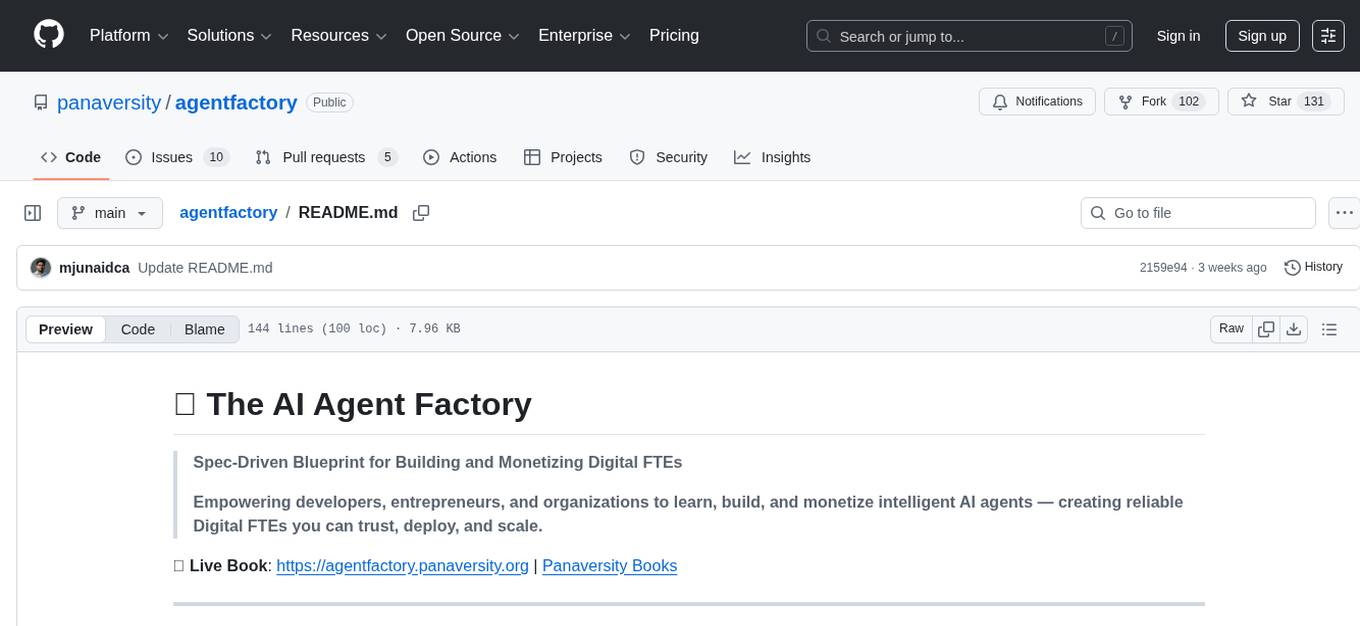
agentfactory
The AI Agent Factory is a spec-driven blueprint for building and monetizing digital FTEs. It empowers developers, entrepreneurs, and organizations to learn, build, and monetize intelligent AI agents, creating reliable digital FTEs that can be trusted, deployed, and scaled. The tool focuses on co-learning between humans and machines, emphasizing collaboration, clear specifications, and evolving together. It covers AI-assisted, AI-driven, and AI-native development approaches, guiding users through the AI development spectrum and organizational AI maturity levels. The core philosophy revolves around treating AI as a collaborative partner, using specification-first methodology, bilingual development, learning by doing, and ensuring transparency and reproducibility. The tool is suitable for beginners, professional developers, entrepreneurs, product leaders, educators, and tech leaders.
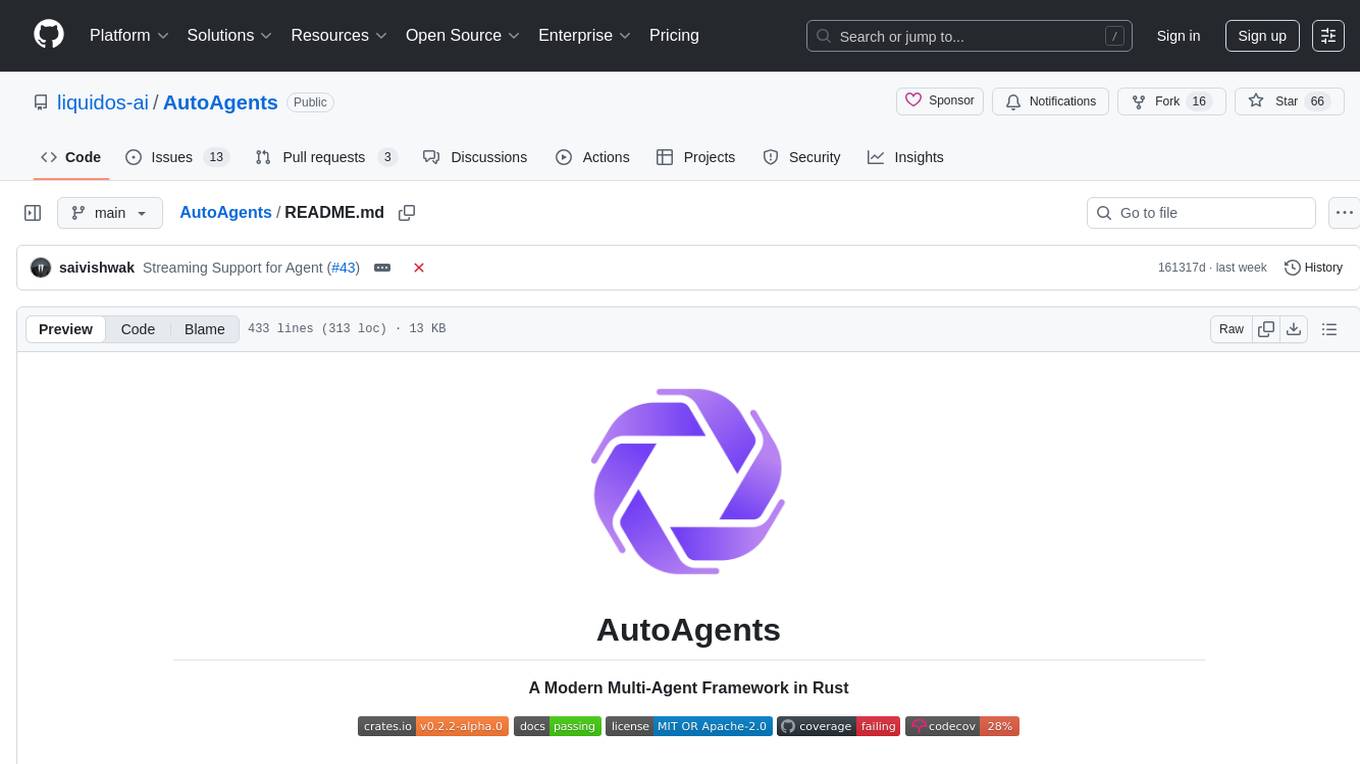
AutoAgents
AutoAgents is a cutting-edge multi-agent framework built in Rust that enables the creation of intelligent, autonomous agents powered by Large Language Models (LLMs) and Ractor. Designed for performance, safety, and scalability. AutoAgents provides a robust foundation for building complex AI systems that can reason, act, and collaborate. With AutoAgents you can create Cloud Native Agents, Edge Native Agents and Hybrid Models as well. It is so extensible that other ML Models can be used to create complex pipelines using Actor Framework.
For similar jobs

sweep
Sweep is an AI junior developer that turns bugs and feature requests into code changes. It automatically handles developer experience improvements like adding type hints and improving test coverage.

teams-ai
The Teams AI Library is a software development kit (SDK) that helps developers create bots that can interact with Teams and Microsoft 365 applications. It is built on top of the Bot Framework SDK and simplifies the process of developing bots that interact with Teams' artificial intelligence capabilities. The SDK is available for JavaScript/TypeScript, .NET, and Python.

ai-guide
This guide is dedicated to Large Language Models (LLMs) that you can run on your home computer. It assumes your PC is a lower-end, non-gaming setup.

classifai
Supercharge WordPress Content Workflows and Engagement with Artificial Intelligence. Tap into leading cloud-based services like OpenAI, Microsoft Azure AI, Google Gemini and IBM Watson to augment your WordPress-powered websites. Publish content faster while improving SEO performance and increasing audience engagement. ClassifAI integrates Artificial Intelligence and Machine Learning technologies to lighten your workload and eliminate tedious tasks, giving you more time to create original content that matters.

chatbot-ui
Chatbot UI is an open-source AI chat app that allows users to create and deploy their own AI chatbots. It is easy to use and can be customized to fit any need. Chatbot UI is perfect for businesses, developers, and anyone who wants to create a chatbot.

BricksLLM
BricksLLM is a cloud native AI gateway written in Go. Currently, it provides native support for OpenAI, Anthropic, Azure OpenAI and vLLM. BricksLLM aims to provide enterprise level infrastructure that can power any LLM production use cases. Here are some use cases for BricksLLM: * Set LLM usage limits for users on different pricing tiers * Track LLM usage on a per user and per organization basis * Block or redact requests containing PIIs * Improve LLM reliability with failovers, retries and caching * Distribute API keys with rate limits and cost limits for internal development/production use cases * Distribute API keys with rate limits and cost limits for students

uAgents
uAgents is a Python library developed by Fetch.ai that allows for the creation of autonomous AI agents. These agents can perform various tasks on a schedule or take action on various events. uAgents are easy to create and manage, and they are connected to a fast-growing network of other uAgents. They are also secure, with cryptographically secured messages and wallets.

griptape
Griptape is a modular Python framework for building AI-powered applications that securely connect to your enterprise data and APIs. It offers developers the ability to maintain control and flexibility at every step. Griptape's core components include Structures (Agents, Pipelines, and Workflows), Tasks, Tools, Memory (Conversation Memory, Task Memory, and Meta Memory), Drivers (Prompt and Embedding Drivers, Vector Store Drivers, Image Generation Drivers, Image Query Drivers, SQL Drivers, Web Scraper Drivers, and Conversation Memory Drivers), Engines (Query Engines, Extraction Engines, Summary Engines, Image Generation Engines, and Image Query Engines), and additional components (Rulesets, Loaders, Artifacts, Chunkers, and Tokenizers). Griptape enables developers to create AI-powered applications with ease and efficiency.




